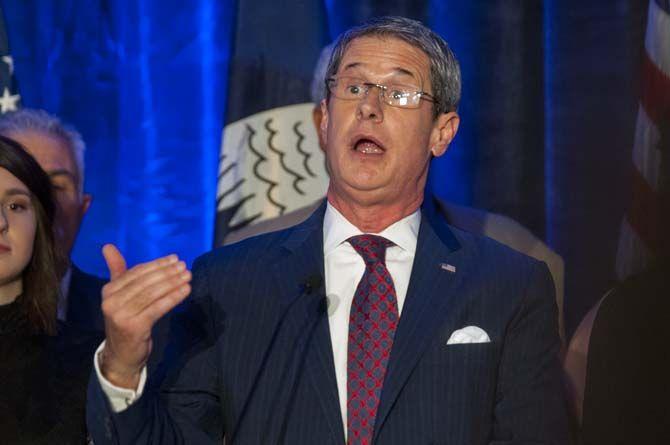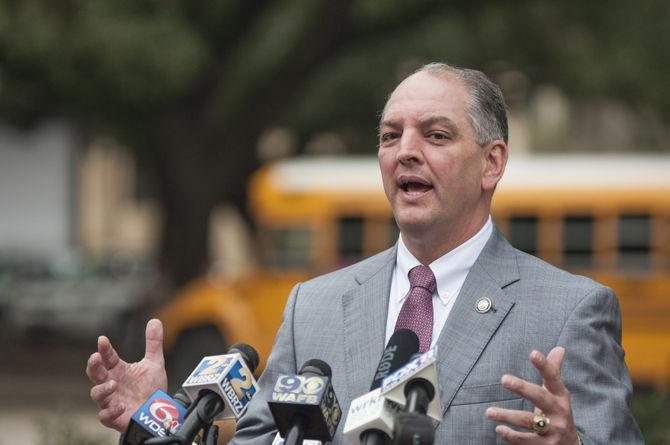With less than two weeks until the Nov. 21 election, party lines are muddled in the Louisiana gubernatorial runoff. Voters in the red state are left with two choices: state Rep. John Bel Edwards, an anti-abortion, pro-gun Democrat endorsed by Republican lieutenant governor and former gubernatorial primary candidate Jay Dardenne, or U.S. Sen. David Vitter, a well-known Republican whose front-runner status eroded following resurfaced personal scandals during his primary campaign.
Edwards surpassed Vitter’s statewide name recognition and positioned himself as the leader, gaining nearly 40 percent of the vote in the jungle primary, while Vitter edged out Public Service Commissioner Scott Angelle by around 41,000 votes. On election night, both candidates laid the foundation for their nearly month-long fight for the governor’s office, pitting two unpopular names in Louisiana against each other: President Barack Obama and Gov. Bobby Jindal.
“Vitter is Jindal on steroids,” Edwards said at his Oct. 24 election night party in downtown Baton Rouge after securing a spot in the runoff.
That same night, Vitter spoke to supporters at his party in Kenner, saying, “Voting for Edwards would be the same as voting for Barack Obama.”
Edwards, leading in some recent polls by double-digits, recently unveiled a new television advertisement overtly shifting the focus to Vitter’s prostitution scandal, which surfaced in 2007 — a topic Edwards largely left to the other Republican candidates during the primary.
“David Vitter chose prostitutes over patriots,” the advertisement said, which asserted that Vitter missed a congressional vote honoring veterans to call an escort service.
While it may offend some voters, said LSU mass communication professor Martin Johnson in an email, the advertisement will motivate Edwards’ supporters and push some on-the-fence voters into Edwards’ corner.
“It’s a jaw-dropping ad,” Johnson said. “Both candidates are running hard here at the end.”
Edwards introduced himself to primary voters while the Republican candidates battled amongst themselves, Johnson said in an interview, as conventional wisdom forecasted Edwards and one Republican in the runoff. Edwards defined himself as “all these things people in Louisiana like,” including U.S. Military Academy training and connections to law enforcement, Johnson said.
Vitter’s campaign has stayed in line with his message on election night, trying to tie Edwards to Obama, highlighted by recent advertisements about Edwards’ proposed prison and sentencing reform.
In Kentucky’s gubernatorial race, which has been compared to Louisiana’s, Republican Matt Bevin beat out Democrat Jack Conway, and Johnson said the negative association with Obama succeeded.
Thirty days before the primary, Vitter had about $4.1 million cash on hand, nearly three times as much as Edwards. But according to campaign finance reports filed 10 days before the primary, Vitter had about $1.4 million and Edwards more than $1.2 million.
Differences in campaign funds are not a strong indicator of who will win, Johnson said, and Edwards’ lack of money compared to Vitter’s campaign is supplemented by political action committees like Gumbo PAC, an “anybody but Vitter” organization.
“If you were talking about a race where Vitter had the only money, and Edwards just had no ability to get his message out,” Johnson said, “then it would be very different. You could probably argue that Edwards has enough. There’s a resource differential, but Edwards can be heard.”
Gubernatorial runoff characterized by muddled party lines, strong campaign ads
By Sam Karlin
November 8, 2015
Front runner and U.S. Senator David Vitter making his speech on Saturday Oct. 24, 2015, at The Hilton on Airline Drive in Kenner LA.
More to Discover









